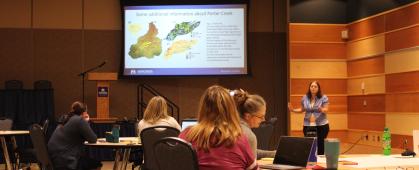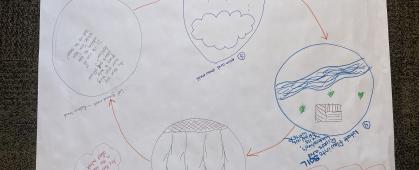Meet Sean Williams, an intern with the 2021 CREWS Undergraduate Research Internship program!
The CREWS Undergraduate Research Internship program supported ten undergraduate students from across the Montana University System during Summer 2021 (Year 3 of the project). These students worked directly with a CREWS advisor to assist with research on a particular aspect of the project, gain hands-on field and lab experience, and further explore their academic, professional, and personal interests and goals.
CREWS Research Intern: Sean Williams
Internship Advisor: Dr. Rob Payn
Sean Williams is a Senior at Montana State University (MSU) majoring in Environmental Engineering. Within his major, Sean enjoys seeing how everything overlaps and connects which has drawn him to pursue a path in remediation. Outside of his classes, Sean has been previously active in Engineers Without Borders, where he looked at applying coursework to help people internationally (which also aligns with what he would like to do in the future), taken on leadership roles in the American Society of Civil Engineers (ASCE), and been involved in the monthly “Service Saturday” volunteer opportunity at MSU. Sean also enjoys exercising, backpacking, camping, hiking, and the outdoors, downtime, movies, and growing his interest in travel.
Sean applied to the CREWS undergraduate research internship to gain research and lab experience as well as exposure to the ecological side of environmental engineering. As Sean said, “Within our major, there is little flexibility and availability to take ecology classes which have been a disappointment with how important it is in remediation. I also [took] classes in hydrology and extensive chemistry, so it seemed like a good fit. [And I] hope to be able to be in the field in my profession.” Sean’s professional, academic, and personal goals span many different areas, and the CREWS internship aligned with interests of his that include remediation, applied chemistry, hydrology, interconnection, collaboration, problem-solving, and skill development, among others.
The focus of Sean’s internship was a spatial variation study of Porter Creek in the Judith River Watershed that looks to better understand water chemistry along the reach and how it is impacted by upland versus riparian influent groundwater. As part of this project, Sean helped graduate student Madison Foster collect data and clean and calibrate sensors, and he assisted in a variety of other activities with Madison to help with data analysis and calculations. Apart from his work with the sensors, Sean was able to practice making standards and dilutions and create standard curves for each sensor. He also collected discharge measurements through the USGS 6/10th method and dilution gauging and spent time learning how to use RStudio coding software. Sean worked primarily with Madison, fellow CREWS undergraduate research intern Zoe Durkin, and Dr. Robert Payn, and tangentially with graduate student Caitlin Mitchell, Dr. Toby Koffman, Dr. Stephanie Ewing, and Dr. Ann Marie Reinhold.

